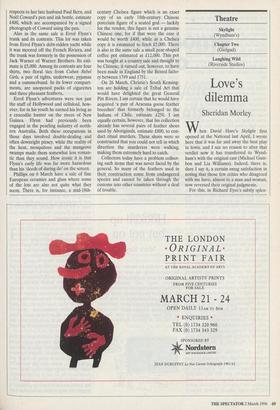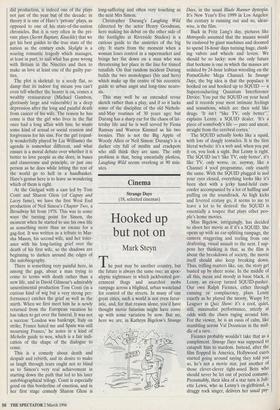Theatre
Skylight (Wyndham's) Chapter Two (Gielgud) Laughing Wild (Riverside Studios)
Love's dilemma
Sheridan Morley
When David Hare's Skylight first opened at the National last April, I wrote here that it was far and away the best play in town, and I see no reason to alter that verdict now it has transferred to Wynd- ham's with the original cast (Michael Gam- bon and Lia Williams). Indeed, there is, dare I say it, a certain smug satisfaction in noting that those few critics who disagreed with me have, almost to a man and woman, now reversed their original judgments.
For this, in Richard Eyre's subtly splen- did production, is indeed one of the plays not just of the year but of the decade: in theory it is one of Hare's 'private' plays, as opposed to one of his state-of-the-nation chronicles. But it is very often in the pri- vate plays (Secret Rapture, Knuckle) that we get his best guides to the true state of the nation as the century ends. Skylight is a soaring romantic tragedy which manages, at least in part, to nail what has gone wrong with Britain in the Nineties and then to make us love at least one of the guilty par- ties.
The plot is skeletal: to a seedy flat, so damp that its indoor fog means you can't even tell whether the heater is on, comes a wealthy restaurateur (Michael Gambon, gloriously large and vulnerable) in a deep depression after the long and painful death from cancer of his wife. The reason he has come is that the girl who lives in the flat once had a long affair with him; he wants some kind of sexual or social reunion and forgiveness for his sins. For the girl (equal- ly wonderfully played by Lia Williams) the agenda is somewhat different, and what ensues is a moral debate over whether it is better to love people as she does, in buses and classrooms and principle, or just one person as he does while letting the rest of the world go to hell in a handbasket. Hare's genius here is to leave us wondering which of them is right.
At the Gielgud with a cast led by Tom Conti and Sharon Gless (of Cagney and Lacey fame), we have the first West End production of Neil Simon's Chapter Two, a Broadway hit from 1976. This was in some ways the turning point for Simon, the moment when he started to use his own life as something more than an excuse for a gag-fest. It was written as a tribute to Mar- sha Mason, his second wife, and her toler- ance with his long-lasting grief over the death of his first wife, so the shadows are beginning to darken around the edges of the autobiography.
There is something very painful here, in among the gags, about a man trying to come to terms with death rather than a new life, and in David Gilmour's admirably unsentimental production Tom Conti (in a curious kind of wig but a very strong per- formance) catches the grief as well as the mirth. When we first meet him he is newly returned from the European vacation he has taken to get over the funeral. It was not a success: 'London was bankrupt, Italy on strike, France hated me and Spain was still mourning Franco,' he notes in a kind of Michelin guide to woe, which is a fair indi- cation of the shape of the dialogue to come.
This is a comedy about death and despair and rebirth, and its desire to make us laugh through tears ought not to blind us to Simon's very real achievement in starting down the path that led to his later autobiographical trilogy. Conti is especially good on this borderline of emotion, and in her first stage comedy Sharon Gless is long-suffering and often very touching as the next Mrs Simon.
Christopher Durang's Laughing Wild (directed by the actor Henry Goodman, here making his debut on the other side of the footlights at Riverside Studios) is a curious guide to the anxieties of the big city. It starts from the moment when a woman loses control in a supermarket and brings her fist down on a man who was threatening her place in the line for tinned tunafish. On that random incident Durang builds the two monologues (his and hers) which make up the centre of his eccentric guide to urban angst and long-time neuro- sis.
This may well be an extended revue sketch rather than a play, and if so it lacks some of the discipline of the old Nichols- and-May routines of 30 years ago; but Durang has a sharp ear for the chaos of lat- terday life and he is well served by Fiona Ramsay and Warren Kimmel as his two loonies. This is not the Big Apple of Woody Allen or Neil Simon: Durang's is a darker city full of misfits and crackpots who still think they are sane. The only problem is that, being essentially plotless, Laughing Wild seems overlong at 90 min- utes.



































































 Previous page
Previous page